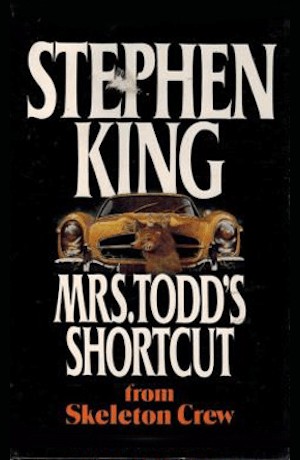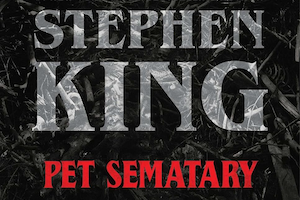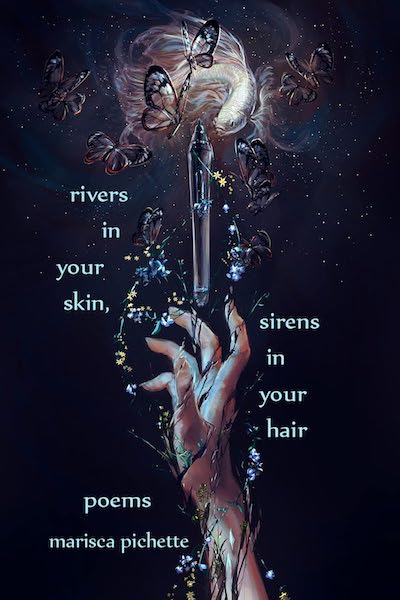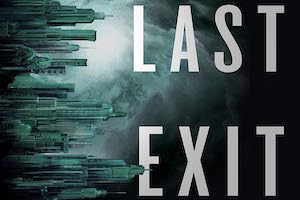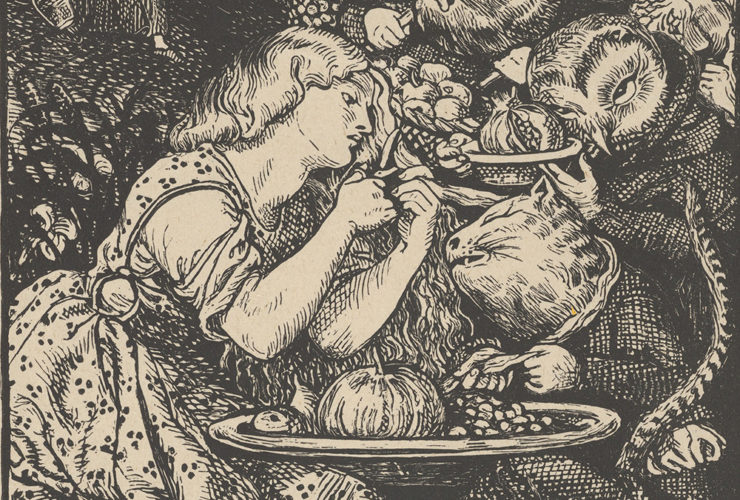Welcome back to Reading the Weird, in which we get girl cooties all over weird fiction, cosmic horror, and Lovecraftiana—from its historical roots through its most recent branches.
This week, we cover Stephen King’s “Mrs. Todd’s Shortcut,” first published in the May 1984 issue of Redbook but easier to find in the Skeleton Crew collection. Spoilers ahead.
“Bugs was splashed all over the windshield—only they didn’t look like no kind of bugs I ever seen before.”
Homer Buckland and narrator Dave Owens sit outside Bell’s Market in Castle Rock, Maine. Homer looks after vacation homes of summer residents including the Todds, but gives Mrs. Todd an unenthusiastic nod when she drives by. He dislikes Worth Todd’s second wife every bit as much as he liked Ophelia Todd, the first one.
Summer people aren’t as interesting to locals as they imagine, but Ophelia Todd was different. When she disappeared, people felt the loss. She’d involved herself in the town, scouring the war memorial and driving kids to swim lessons.
Since Homer’s wife died, Dave’s seen Homer out on his porch at dusk, like he’s waiting for the next thing. This October afternoon, the sky over the lake is passing fair, and Homer’s recalling how fast Ophelia used to drive her “go-devil” Mercedes. She was always looking for a shortcut. If you can save enough distance, she’d say, you can save time. She had road atlases and maps and topographical surveys with her routes marked out. Worth Todd never cared “piss-all” about her “hobby,” but Homer (and Dave) understand the power knowing shortcuts confers.
One day Ophelia told Homer about her search for the shortest way between Castle Rock and her Bangor home. The usual routes varied between 163.4 miles and 144.9 miles. Another was better, 129.2 miles. It wasn’t the “blue-ribbon” route, though. “No blue ribbon is forever,” she explained. After all, the four-minute mile was supposed to be the limit of human ability, and then we broke it. “There is zero and there is eternity, and there is mortality, but there is no ultimate.”
She was thirty-four or -five then, but with excitement lighting her face she looked twenty. The current blue-ribbon route, a combo of paved and dirt and forest roads, was 116.4 miles. Homer’s incredulity made her challenge him to ride the route with her. He wanted badly to go, if only to watch her drive, but it’d have to be another day; his wife was waiting. Ophelia left the offer open and urged him to measure the distance on a map. As crows fly, the mileage was a surprising 79 miles. Crows, unlike cars, could surmount all impediments.
Next spring, his wife away, Homer rode with Ophelia on her latest shortcut of 111 miles. On roads he never knew existed, she looked so wild and free he both loved and feared her. She was like a goddess, Diana, with the Mercedes as her moon-chariot. It might kill a man to love her. Her route passed through forests long undriven, then fantastic roads lined with willows that tried to grab them, plants that twisted into faces, a stump-sitting tree-toad big as a cat.
They made it to Bangor in 111.6 miles and a couple hours. Diana faded from Ophelia, but not all the way. After giving Homer a chaste but deeply thrilling kiss on the cheek, Ophelia remained in Bangor overnight, while Homer drove her car back to Castle Rock–on the turnpike.
“There are holes in the middle of things,” Homer tells Dave. He recalls the summer Ophelia disappeared, how young and untamed she looked, how she claimed to have gotten her shortcut down to sixty-seven miles. Impossible, Homer told her. Fold the map, she countered. Remembering their eerie shared drive, Homer said she shouldn’t try to fold land. Ophelia couldn’t quit, though: the shortcut was the one thing in her life that was there, and was hers.
Later that summer, Ophelia called Homer to bring a spare key to her house–she’d misplaced hers and was just leaving Bangor for Castle Rock. He arrived forty-five minutes later to find her mud-caked go-devil in the driveway. Stuff like seaweed moved in the mud, strange bugs splattered the windshield. Up front was an animal corpse, something between a woodchuck and a weasel, with venom-dripping needle-teeth sunk right into the steel radiator grill. Homer checked the odometer: The trip reading was 31.6 miles.
A week later, the last time Homer saw Ophelia, he confronted her about her roadkill. If that was what a woodchuck looked like, what would a bear be? No worry, Ophelia said. On the shortcut, she wasn’t Worth Todd’s wife, who couldn’t carry a child to term, who failed at writing poetry, who took notes at committee meetings. On the shortcut, she was in the heart of herself, she was–
Diana, Homer said.
A woman might want to be a goddess, Ophelia admitted, but not one lolling on Olympus. She wanted to stand, or walk, or–drive.
Then be careful where you drive, Homer said. A week later, Worth reported Ophelia missing. Seven years later, he had her declared legally dead.
Homer doesn’t expect Dave to believe his story. Dave does, though.
Two years later Homer visits Dave, looking sixty rather than his actual seventy. He’s going away, and Dave can tell people it’s to Vermont. Dave asks: “What does she look like now?”
“Like Diana,” Homer says. “But she is kinder.” Then he walks to a waiting car, beat-up but rumbling with latent power. Through the open passenger door, Dave glimpses her forehead shining like the moon. Her beauty is terrible, but her glance doesn’t kill him, though “part of [him] died at her feet.”
In October, when the sky over the lake is passing fair, Dave thinks about Ophelia and Homer. Olympus must be a glory to the eyes and heart, but he knows Castle Rock and couldn’t leave it for any shortcut.
What’s Cyclopean: Homer struggles to describe Ophelia’s roadkill: a cross between a woodchuck and a weasel, with eyes like yellow marbles, claws like a cat, teeth like needles, and poison like a rattlesnake.
The Degenerate Dutch: Castle Rock is suspicious of summer people in general, but Massachusetts—“that strange, angry, fuming state”—comes in for particular disparagement. Obviously a grudge from the last time the Miskatonic Squids beat the Castle Rock Clowns.
Weirdbuilding: Welcome to Castle Rock. Some towns have potholes, and others just have… holes. Drive carefully.
Libronomicon: Atlases can only take you so far. Probably farther than a GPS, but then again, try following the route next time yours says “Turn off the paved road” and see what happens.
Madness Takes Its Toll: We would get the most literal possible entry here if the shortcut had a toll booth, but no. However, the roadkill from the shortcut does hurt your eyes, and worse, your mind.
Anne’s Commentary
Just when we thought it was safe to go back into the woods, another group of willows (or willow-like things) starts acting up! Like T. Kingfisher’s bushes, Stephen King’s trees can move, and snatch, and grab. Worse, along the iffiest section of Mrs. Todd’s shortcut all the vegetation is self-mobile. The grasses wave; plants tie themselves into knots to make faces at intruders. Really rude faces, too, I expect. Or hungry ones.
The fauna on the iffy sections aren’t cuddly, either. Homer spots a cat-sized toad. Ophelia road-kills a “woodchuck” with needle teeth that pierce the steel of her radiator grill. Certain it has “a headful of venom just like a rattlesnake,” Homer takes care rather than caretakes and refrains from “yonking” the beast off his employer’s Mercedes.
Ophelia Todd will “yonk” it off herself, wearing garden gloves because she’s no fool. One of her aspects or personae is a smart and capable, funny and generous woman, while the other is equivalent to a goddess. Watching wild divinity creep into Ophelia’s face, Homer is “took with love” for her. Any man would be, and probably any woman too. Right you are, Homer. I have been took with love for Mrs. Todd since the first time I read King’s story, and I’d ride shotgun with her any time–that is, if I was packing a shotgun loaded for interfold bears.
An “interfold” is how I think of her shortcut, a space created when a plane or a route buckles to cut the distance between two points. To get from point A to point B expeditiously, one must pass through the interfold, the weirdness underlying our plane of existence. In the interfold there may be monsters, but there are also serious perks, such as retrograde aging and “deification.” Homer, at least, describes the change in Ophelia as her progress from woman to goddess. Ophelia acknowledges that women may want to be goddesses, but not the kind set static on pedestals or lolling in luxury on Olympus. What a woman wants, per Ophelia, is “To stand if she will, or walk… or to drive, Homer.”
Forget the goddess thing, unless to embody one’s essence is to attain divinity. “I am all myself over there,” Ophelia insists. She’s free from the accumulating accidents of her past, of being a wife, a failure at childbearing and poetry, a committee notetaker. Homer calls her Diana, fitting as Diana too is a driver, the Moon her Mercedes.
I had difficulty writing the summary for “Mrs. Todd’s Shortcut.” That’s because it is such a dense tale, with layers I had to ignore to come in with a reasonable word count. The frame structure of “Shortcut” is as complex as some Baroque confection produced not in Venice or France but in the downeast heart of New England. Dave’s narration opens and closes the piece, bookending Homer’s reminiscence; however, Dave doesn’t disappear once Homer starts talking, becoming all ears and no mouth or immediate reaction. Periodically King returns us to the bench in front of Bell’s Market, from which Dave can watch slow-moving clouds sail over a sun-spangled lake. The friends sit at the comfortable center of their world, the Castle Rock which King often visits with his bulging peddler’s sack of horrors but also with deep affection for his Maine, his place, setting as character, as the best settings are.
Setting, place, the land, is Ophelia’s antagonist, intimately known, relentlessly but lovingly wrestled with. It is a land worthy of her, and she is worthy of its weird side. Dave and Homer have also glimpsed the weird side of Castle Rock pre-shortcut. Out jacklighting deer in the hungry year of ‘59, Dave saw orange light descend from the sky. It hit the lake and burst into a purple-orange that shot back skyward in rays. Sounds Color Out of Spacey to me, but no one in Castle Rock has come down with the Desiccated Crumbles–yet. The light’s one of Homer’s “holes in the middle of things.” As Dave couldn’t fit it into his philosophy, and as “the day is going to come up nevertheless,” he decided to leave the light alone. This is Dave’s pattern. His curiosity is keen, but it only leads him to a so far far short of riding Mrs. Todd’s shortcut.
Homer’s pre-shortcut weird experience happened when he was sixteen. Plowing a field, he snagged a rock that split open to well blood from the cleft. Going full-Freud, young Homer ejaculated in his drawers–perhaps he’d just deflowered Earth Herself? That, or the sanguineous rock was an omen? Homer seems as fixed in Castle Rock as Dave, but once a widower he’s ready for the “next thing,” whereas Dave would have awaited “the last one.”
It’s sweet that Homer’s “next thing” is Ophelia undisappearing to take him for another interfold ride. Boy gets girl, and nobody’s eaten or rendered hopelessly insane, either.
Bracing for our next long-form selection, I needed that happy ending.
Ruthanna’s Commentary
This was one of my favorite King stories in my teens, and now I remember why. King knows about fifty tricks of which I like exactly two, but at 45 I still have zero resistance to male-POV stories about their attraction-repulsion to women’s power, where I can probably imagine more of the woman’s POV than the author ever did. I also have zero resistance to the idea that if you just take the right turn-off, you could leave behind mundane limits and find your way to lands uncharted…
Thirty years after reading this story, I recalled the following: Mrs. Todd’s disappearance and the terrifying roadkill stuck to her front grille. I forgot her goddesshood, the trials of mediocre marriage and failed dreams that set her on the road, her relationship with Homer, his direct witness of her shortcut. I forgot that she survives.
Ophelia/Diana—and I don’t think it’s a coincidence that those are her options—says that all women want to be goddesses. But not the kind that get put on a pedestal or worshipped, nor the kind that laze on Olympus. The kind that exceed human limits, that are supernatural in their agency. Her motivations are not of Olympus but the Olympics. She seeks excellence, even if she has to break natural laws to do it. She gets her 2-minute mile. And she comes out better, in the race against things man wasn’t meant to know, than most of the men we’ve encountered.
There’s something terribly appealing about that sort of pursuit—despite the dangers to both pursuer and companion. Homer’s up for the risk, and Ophelia ultimately gets her kindred spirit. Dave, like Homer’s and Ophelia’s original spouses, isn’t tempted. Unlike them, though, it seems like he can appreciate a taste of that maybe-deadly beauty.
Most of the time, King’s powerful women and girls are overwhelmed by massive force. Fail or succeed, they’re more or less in the same narrative slot as Godzilla. Ophelia is up against her own life and her own chosen risks, and it makes her more human as well as a more sympathetic goddess. Maybe that’s what lets her turn down the moonshine, once she’s won her race, and become something that could permit a man to survive loving her.
If there’s horror here, it seems like something subtler than woman-as-goddess-as-monster. It’s Homer’s “holes in the middle of things.” It’s the moments that don’t fit, the opportunities for something beyond this world—more dangerous and more alive—that most people gloss over in their perceptions and memories. Depending on who you are, the horror might be that these discontinuities exist, or it might be the ease with which we route around inconvenient chances to risk it all for joy and excellence.
It’s a trickier gamble when you consider the overarching mythos of Castle Rock. Like Arkham or Sunnydale, most of the mysteries to be explored there will not turn out well for intrepid explorers. There’s probably a sociological dissertation to be had (at Miskatonic) in studying the effect of hellmouths on local culture and risk aversion. Ophelia/Diana takes the gamble, though, and it comes up wonder and glory.
I’m spending this week in my home town in coastal Massachusetts–sorry, Castle Rockers. There are back roads full of strange nostalgia, and dark nights, and recollections of a time when a fast drive would cover your windshield with bugs. I wonder what might happen if I took just the right turn…
Join us next week as we start our new longread, with Chapter 1 of John Connoly’s Fractured Atlas.
Ruthanna Emrys is the author of the Innsmouth Legacy series, including Winter Tide and Deep Roots. Her short story collection, Imperfect Commentaries, is available from Lethe Press. You can find some of her fiction, weird and otherwise, on Tor.com, most recently “The Word of Flesh and Soul.” Ruthanna is online on Twitter and Patreon, and offline in a mysterious manor house with her large, chaotic household—mostly mammalian—outside Washington DC.
Anne M. Pillsworth’s short story “The Madonna of the Abattoir” appears on Tor.com. Her young adult Mythos novel, Summoned, is available from Tor Teen along with sequel Fathomless. She lives in Edgewood, a Victorian trolley car suburb of Providence, Rhode Island, uncomfortably near Joseph Curwen’s underground laboratory.










